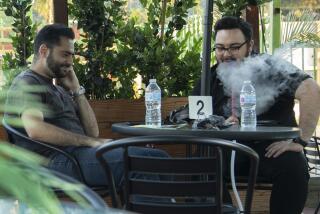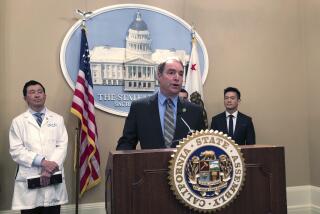Kizer Says Anti-Smoking Ads Work : Health: State official says people are remembering the campaign’s message. But it is too early to tell how many are following its advice.
- Share via
State officials say that while it may be too early to tell how many Californians are quitting smoking because of the state’s anti-smoking campaign, at least people remember what they are being told.
State Health Director Kenneth W. Kizer said that of 18,000 Californians queried in a survey that began three months after anti-smoking ads debuted last year, 75% remembered the ads.
“That shows our campaign is working,” Kizer said in an interview Monday.
The rate of recall, determined by telephone surveys conducted under a state contract with UC San Diego, was higher than Kizer said he had expected.
“At this point that is probably our strongest indicator” that people are giving up cigarettes because of the state’s aggressive campaign, Kizer said. Determining how many Californians have stopped smoking since the campaign began is more difficult, he said, but he believes the figure is around 750,000.
That figure is a loose estimate, Kizer said, and includes people who have quit and youths who have decided against starting. It also includes people who have died from smoking, which has nothing to do with the ad campaign. That factor, along with the brief duration of the campaign, makes it hard to be certain how many people are quitting.
The anti-smoking campaign resulted from passage of Proposition 99 in 1988, which established a 25-cent tax on each pack of cigarettes and has paid for approximately $221 million in tobacco education programs over an 18-month period. Of that amount, $28.6 million has been earmarked for an advertising campaign aimed at minorities and youths.
Kizer said he was encouraged by the high recall rate reflected by the survey. “That’s a phenomenal figure,” he said.
An official with the Tobacco Institute disagreed.
“It doesn’t surprise me,” said Walker Merryman, vice president of the Washington-based institute, “considering the money they have spent.”
“They have saturated the public consciousness with their incredible propaganda, and I would be amazed if public recognition was less than 75%,” Merryman said. The high recall “suggests they are succeeding” in the campaign against smoking, Merryman said.
“Totalitarian nations are very good at that sort of thing,” he added.
Kizer, who will present the survey results at a news conference today in Los Angeles, said the research also shows that even smokers believe it should be harder for minors to get cigarettes.
It is against the law for persons under 18 to buy cigarettes, but enforcement is “a joke,” Kizer said, because anyone can buy them through the mail and vending machines.
He said the survey showed that 75% of the state’s smokers believe cigarettes should not be available as free samples, through the mail or through vending machines. “Among nonsmokers, the numbers go up into the high 80s,” Kizer said.
The survey was conducted by UC San Diego’s Population Studies for Cancer Prevention and Los Angeles-based IOX Assessment Associates.
More to Read
Get the L.A. Times Politics newsletter
Deeply reported insights into legislation, politics and policy from Sacramento, Washington and beyond. In your inbox twice per week.
You may occasionally receive promotional content from the Los Angeles Times.










